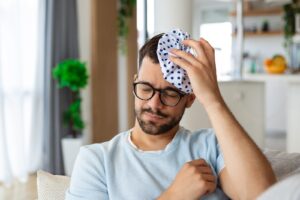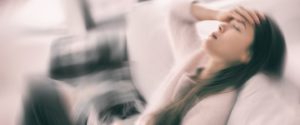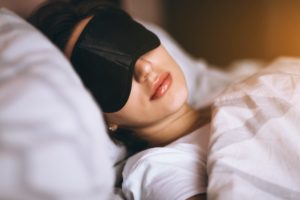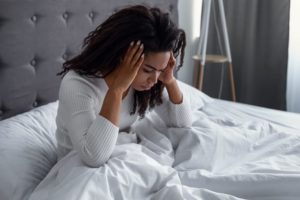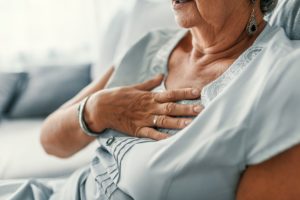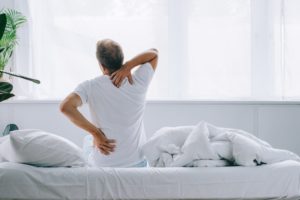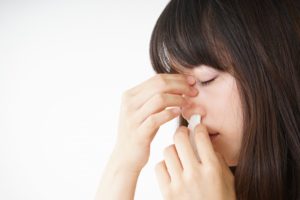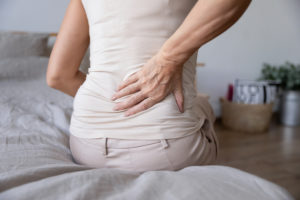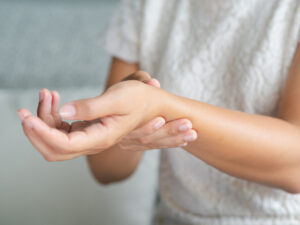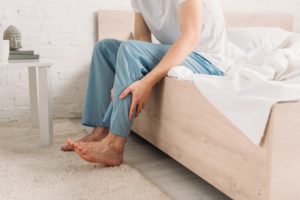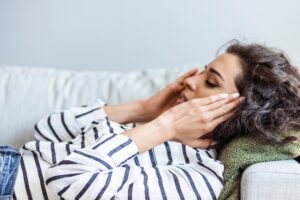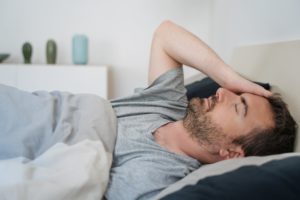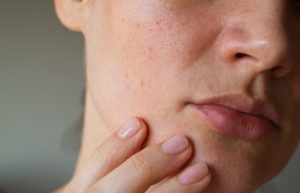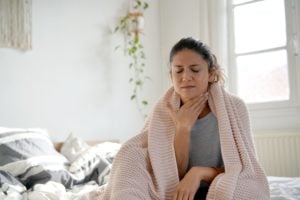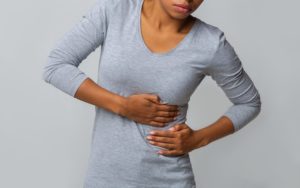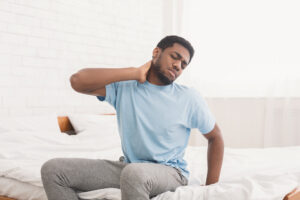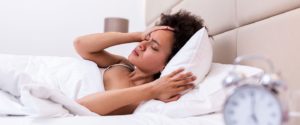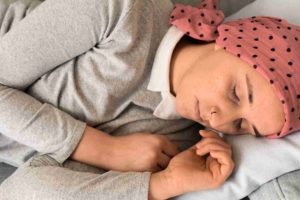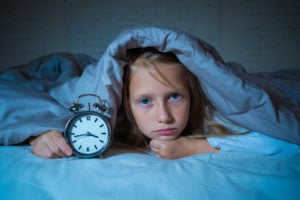Waking Up Gasping for Air: Exploring Causes and Treatment
- Waking up gasping for air can have multiple causes including sleep-related breathing disorders, nocturnal panic attacks, and GERD.
- Breathing difficulties during sleep can worsen sleep quality, lead to daytime fatigue, and affect overall well-being.
- Tell your doctor if this symptom occurs regularly, as identifying and addressing the underlying cause is crucial.
- Treatment options vary and may involve lifestyle changes, medications, or therapy.
Waking up gasping for breath can be frightening, and if it happens often, it may negatively impact sleep quality. There are many reasons why someone might wake up gasping for air, including sleep-related breathing disorders or panic attacks . If this is happening to you regularly, it is worth looking into so you can seek treatment for the underlying cause.
Is Your Sleep Disruption a Concern?
Waking up with a shortness of breath is often indicative of other issues such as sleep apnea. Answer three questions to understand if you should be concerned.
Obstructive Sleep Apnea
Obstructive sleep apnea (OSA) is a sleep-related breathing disorder that causes total or partial pauses in breathing during sleep. OSA develops when the airways collapse and become obstructed. People with OSA may snore loudly or wake up choking or gasping for breath. Additional symptoms include morning headaches, trouble focusing, and feeling excessively tired or irritable during the day.
OSA may affect approximately 12% of American adults and is believed to be more common in anyone with a prostate. It can be diagnosed in a sleep lab or with an at-home sleep apnea test.
One of the most effective treatments for OSA is continuous positive airway pressure (CPAP) therapy. The CPAP machine delivers a steady stream of air to keep the airway open via an interface worn over the face during sleep. There are also alternative options for people who do not respond well to CPAP therapy, such as positive airway pressure with automatically adjusting airflow or mouthpieces that move the jaw forward.
Additionally, people with OSA may receive a recommendation to lose weight, as obesity significantly increases the risk of OSA. Doctors may also recommend switching to sleep on the side instead of the back.
Central Sleep Apnea
Central sleep apnea (CSA) is a less common form of sleep apnea believed to affect approximately 1% of middle-aged to older adults . Instead of a physical obstruction, the pauses in breathing occur when the brain fails to send the signal to breathe. Heart failure, opioid use, and sleeping at high altitudes are all correlated with CSA . Treatment of CSA depends on the cause and may involve positive airway pressure therapy, medication, or treatment for an underlying condition.
Hypnic Jerks and Sleep Paralysis
Certain experiences that occur when falling asleep or waking up may cause uncomfortable breathing sensations.
Hypnic jerks, also known as sleep starts, are the sudden, involuntary muscle jerks you may experience as you fall asleep. Hypnic jerks usually affect one side of the body and may be accompanied by the feeling of falling, hearing a banging or snapping sound, or seeing flashing lights or another visual hallucination. Hypnic jerks are normal and common, but they can be disorienting and may cause quick or irregular breathing.
A similar phenomenon known as sleep paralysis can cause an inability to move when the sleeper first wakes up, which is sometimes accompanied by chest pressure and shortness of breath. Sleep paralysis is believed to arise when the brain partially wakes up but retains the muscle paralysis that occurs during dreams. Some people with sleep paralysis report hallucinations of a presence in the room or someone sitting on their chest.

Panic Disorder
Nocturnal panic attacks can cause people to wake up with shortness of breath, choking, or feelings of being smothered. These may be accompanied by other panic attack symptoms such as a pounding heart, sweating, tingling sensations, or feelings of unreality or not being yourself.
People may experience panic attacks only at night, or during the day as well. When they occur at night, panic attacks can disrupt sleep. Nocturnal panic attacks typically occur during the first third of the night. Researchers believe they are more common during deep sleep and may be related to night terrors.
Treatment for panic disorder may include prescription antidepressants or anti-anxiety medications. Deep, slow breathing techniques can help relax the body before bed, as well as make it easier to fall asleep after a nighttime awakening.
Asthma
Factors such as sleep position and allergens in the bedroom can lead to increased mucus and inflammation, triggering asthma symptoms at night . People with asthma may wake up wheezing . In turn, poor sleep may exacerbate asthma symptoms.
Taking daily asthma medication as recommended by your doctor may relieve symptoms of nocturnal asthma.
Acid Reflux
Acid reflux describes a condition when stomach acid flows upward into the esophagus. Approximately one in five adults in the U.S. have gastroesophageal reflux disease (GERD), in which acid reflux symptoms are chronic or severe.
Symptoms of GERD often worsen after eating or when lying down. People with GERD may experience nighttime awakenings and symptoms such as heartburn, regurgitation, coughing, or choking. GERD symptoms can also trigger asthma. As with many other conditions, GERD symptoms impact sleep, but sleep deprivation can also worsen GERD symptoms.
GERD may be managed through medications as well as lifestyle changes, such as:
- Losing weight if you are overweight
- Sleeping with the head and torso slightly elevated
- Eating your last meal at least three hours before bed
Post-Nasal Drip
Post-nasal drip occurs when mucus moves down the throat, often causing the urge to cough for relief. If enough accumulates during sleep, sleepers may wake up coughing . Post-nasal drip can be caused by conditions like a sinus infection, the common cold or flu, and seasonal allergies.
Post-nasal drip can worsen when you are lying on your back. If you are feeling sick or stuffed up, try propping up your head while sleeping. Breathing in warm steam or using a humidifier in the bedroom can help thin out mucus. Your doctor may also recommend nasal sprays, antihistamines, or decongestants to relieve congestion and help you breathe more easily.
Heart Failure
In congestive heart failure , the heart becomes less effective at pumping blood, which can lead to fluid buildup in the lungs and other parts of the body. The excess fluid can create congestion and trouble breathing, especially when lying down . As a result, people with congestive heart failure may gasp for breath during sleep.
Between 1% to 2% of adults have heart failure. Symptoms include shortness of breath, cough, weakness, fatigue, and swelling in the abdomen, legs, and ankles. Heart failure is a chronic condition that is usually managed with medications, lifestyle changes, and sometimes surgery.
An estimated 50% to 80% of people with heart failure have some form of sleep-disordered breathing, such as OSA or CSA. For people with heart failure and mild OSA, lifestyle changes such as losing weight, avoiding alcohol and sedatives, and switching to a non-back sleeping position may help relieve sleep apnea symptoms. Some cases may also be managed with typical sleep apnea treatments such as CPAP therapy.
Respiratory Conditions
Disorders such as cystic fibrosis or chronic obstructive pulmonary disease cause ongoing breathing problems that may interfere with sleep.
Cystic fibrosis is characterized by mucus buildup in the airways. People with this disease often awaken from night coughs or trouble breathing during sleep, and they may be more likely to have an accompanying sleep-related breathing disorder. Sleep disturbances may further exacerbate cystic fibrosis symptoms.
Common in people who smoke, chronic obstructive pulmonary disease (COPD) refers to decreased airflow due to lung damage. Over time, people with COPD develop symptoms such as coughing, wheezing, and shortness of breath. Physiological changes in breathing during sleep may cause additional trouble breathing that can lead to nighttime awakenings, especially for back sleepers.
When to Talk to Your Doctor
Waking up gasping for air every once in a while is not uncommon, and it may have an obvious cause, like a bad dream or a cold. Many conditions that cause nighttime gasping for breath can be treated by improving sleep habits. However, if you regularly wake up gasping for air, or if you notice other symptoms, make an appointment with your doctor. They can look for underlying conditions and help you work out a treatment plan. If you experience chest pain or have difficulty breathing normally, seek medical care immediately.

Still have questions? Ask our community!
Join our Sleep Care Community — a trusted hub of sleep health professionals, product specialists, and people just like you. Whether you need expert sleep advice for your insomnia or you’re searching for the perfect mattress, we’ve got you covered. Get personalized guidance from the experts who know sleep best.
References
22 Sources
-
American Academy of Sleep Medicine. (2014). The International Classification of Sleep Disorders – Third Edition (ICSD-3). Darien, IL., Retrieved February 3, 2022, from
https://aasm.org/ -
Kaczkurkin, A. N., Tyler, J., Turk-Karan, E., Belli, G., & Asnaani, A. (2021). The association between insomnia and anxiety symptoms in a naturalistic anxiety treatment setting. Behavioral Sleep Medicine, 19(1), 110–125.
https://pubmed.ncbi.nlm.nih.gov/31955594/ -
Mohammadieh, A., Sutherland, K., & Cistulli, P. A. (2017). Sleep disordered breathing: Management update. Internal Medicine Journal, 47(11), 1241–1247.
https://pubmed.ncbi.nlm.nih.gov/29105265/ -
Goyal, M., & Johnson, J. (2017). Obstructive sleep apnea diagnosis and management. Missouri Medicine, 114(2), 120–124.
https://pubmed.ncbi.nlm.nih.gov/30228558/ -
Donovan, L. M., & Kapur, V. K. (2016). Prevalence and Characteristics of Central Compared to Obstructive Sleep Apnea: Analyses from the Sleep Heart Health Study Cohort. Sleep, 39(7), 1353–1359.
https://pubmed.ncbi.nlm.nih.gov/27166235/ -
Dempsey, J. A. (2019). Central sleep apnea: Misunderstood and mistreated! F1000Research, 8, F1000 Faculty Rev-981.
https://pubmed.ncbi.nlm.nih.gov/31297185/ -
de Sá, J. F., & Mota-Rolim, S. A. (2016). Sleep paralysis in Brazilian folklore and other cultures: A brief review. Frontiers in Psychology, 7, 1294.
https://pubmed.ncbi.nlm.nih.gov/27656151/ -
Nakamura, M., Sugiura, T., Nishida, S., Komada, Y., & Inoue, Y. (2013). Is nocturnal panic a distinct disease category? Comparison of clinical characteristics among patients with primary nocturnal panic, daytime panic, and coexistence of nocturnal and daytime panic. Journal of Clinical Sleep Medicine, 9(5), 461–467.
https://pubmed.ncbi.nlm.nih.gov/23674937/ -
Jerath, R., Beveridge, C., & Barnes, V. A. (2019). Self-Regulation of Breathing as an Adjunctive Treatment of Insomnia. Frontiers in psychiatry, 9, 780.
https://pubmed.ncbi.nlm.nih.gov/30761030/ -
Koinis-Mitchell, D., Kopel, S. J., Seifer, R., LeBourgeois, M., McQuaid, E. L., Esteban, C. A., Boergers, J., Nassau, J., Farrow, M., Fritz, G. K., & Klein, R. B. (2017). Asthma-related lung function, sleep quality, and sleep duration in urban children. Sleep Health, 3(3), 148–156.
https://pubmed.ncbi.nlm.nih.gov/28526251/ -
Campana, L. M., Owens, R. L., Suki, B., & Malhotra, A. (2012). Measuring upper and lower airway resistance during sleep with the forced oscillation technique. Annals of Biomedical Engineering, 40(4), 925–933.
https://pubmed.ncbi.nlm.nih.gov/22127514/ -
National Institute of Diabetes and Digestive and Kidney Diseases. (2020, July). Acid reflux (GER & GERD) in adults. U.S. Department of Health and Human Services, National Institutes of Health., Retrieved February 4, 2022, from
https://www.niddk.nih.gov/health-information/digestive-diseases/acid-reflux-ger-gerd-adults -
Antunes, C., Aleem, A., & Curtis, S. A. (2021). Gastroesophageal reflux disease. In StatPearls. StatPearls Publishing.
https://pubmed.ncbi.nlm.nih.gov/28722967/ -
A.D.A.M. Medical Encyclopedia. (2019, July 11). Stuffy or runny nose – adult. MedlinePlus., Retrieved February 3, 2021, from
https://medlineplus.gov/ency/article/003049.htm -
Singh, D. P., Jamil, R. T., & Mahajan, K. (2021). Nocturnal Cough. In StatPearls. StatPearls Publishing.
https://pubmed.ncbi.nlm.nih.gov/30335306/ -
National Heart, Lung, and Blood Institute. (n.d.). Heart failure. U.S. Department of Health and Human Services, National Institutes of Health., Retrieved February 4, 2022, from
https://www.nhlbi.nih.gov/health-topics/heart-failure -
Khayat, R., Small, R., Rathman, L., Krueger, S., Gocke, B., Clark, L., Yamokoski, L., & Abraham, W. T. (2013). Sleep-disordered breathing in heart failure: Identifying and treating an important but often unrecognized comorbidity in heart failure patients. Journal of Cardiac Failure, 19(6), 431–444.
https://pubmed.ncbi.nlm.nih.gov/23743494/ -
Tanai, E., & Frantz, S. (2015). Pathophysiology of heart failure. Comprehensive Physiology, 6(1), 187–214.
https://pubmed.ncbi.nlm.nih.gov/26756631/ -
Shakkottai, A., Nasr, S. Z., Hassan, F., Irani, S., O’Brien, L. M., & Chervin, R. D. (2020). Sleep-disordered breathing in cystic fibrosis. Sleep Medicine, 74, 57–65.
https://pubmed.ncbi.nlm.nih.gov/32841845/ -
Katz E. S. (2014). Cystic fibrosis and sleep. Clinics in Chest Medicine, 35(3), 495–504.
https://pubmed.ncbi.nlm.nih.gov/25156765/ -
Agarwal, A. K., Raja, A., & Brown, B. D. (2021). Chronic obstructive pulmonary disease. In StatPearls. StatPearls Publishing.
https://pubmed.ncbi.nlm.nih.gov/32644707/ -
McNicholas, W. T., Hansson, D., Schiza, S., & Grote, L. (2019). Sleep in chronic respiratory disease: COPD and hypoventilation disorders. European Respiratory Review, 28(153), 190064.
https://pubmed.ncbi.nlm.nih.gov/31554703/


